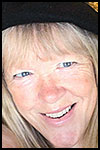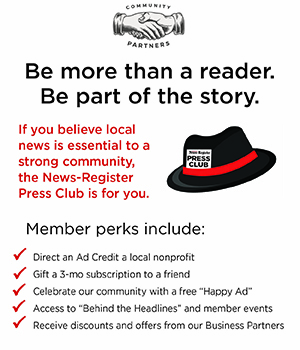Oberst: How to become a novelist
Trying to be a novelist? Here’s one way:
You’re born to two Oregon coast natives — one the eldest of seven who couldn’t wait to have her own brood, the other a preacher who, before his fourth child was born, had written scholarly biblical books on Deuteronomy and II Peter. So your first memory is the sound of your father clicking typewriter keys, your lullaby.
Your life is a series of moves from church to church, along the Pacific Coast between Bandon and Anchorage. As soon as you can write, you begin keeping a diary detailing your childish rage over leaving your friends, your stability and the landscapes that had become home.
You learn to write with detail, so you won’t forget where you’ve been. Your mother and your father tell you each time you move it will be an adventure, an exciting exploration. But you can see in your mother’s face as she packs again and again, that this is not entirely true.
So you write about your sorrows. You try to find words for your feelings.
You spend a good deal of your life sitting on a church bench, listening to the rhythms of your father’s sermons, which become background music to your own secret stories. These stories you write in the margins of church bulletins, or in the back pages of your Bible, or, if you remembered, in the notebook your mother gave you to keep notes on the sermon.
Each time you move, you take with you an ever-expanding number of boxes filled wotj notebooks.
You’re always the new girl, so you often retreat into books. You read everything you can get your hands on, and reading inspires you to write.
Eventually, you realize the only subject in school you really enjoy is English, or something involving similar writing, reading and research.
Your father is pleased when you tell everyone you want to be a writer when you grow up. He’s not so pleased when, after your first year in community college as an English major, you declare yourself an atheist, hitchhike the coast to Ilwaco, Washington, and hop on a fishing boat.
On the boat, you write poetry, along with stories about fishing, and resolve to become a novelist.
You return to your hometown, but after working briefly at your uncle’s newspaper, you decide you will need a degree in journalism to earn a living as a writer, so you begin that course of study at the University of Oregon. And it ends up taking nearly 10 years.
It takes so long because, as much as you hated moving as a child, adventure is in your blood. Between terms, you: go to Germany and have a child, which you give up for adoption; return to Anchorage to sell advertising for a newspaper; become a stripper who becomes involved in a murder; escape to Sri Lanka with a friend to dive for a sunken Dutch ship and buy raw gems.
Finally, a little exhausted, you return to Oregon and finish your degree. You think: I guess I have the material to write a novel now.
Instead, you begin a decades-long career in journalism, which has you writing about everyone else’s adventures. And that you are paid to write their stories amazes you.
You get married to a man who thinks your writing is incredible. Together, you raise two children whom you adore.
You write about them. In your quiet moments, which are rare, you begin sorting through the boxes of stories you began and never finished, intending, someday, to write a novel.
Your children leave home, go to college, earn degrees, start families and careers. You can’t seem to get going on those novels, so you go back to college for a master’s degree in English.
Instead of working on your own novels, you help your watershed council publish a book. After that you, your son and your husband launch a fun beer magazine.
When your son moves on, you sell it. You think about starting another project but then, you remember: You want to be a novelist, and you are mortal.
You have stories to tell. You are lucky enough to have the free time to put them together. If not now, when? So you start to plan the Great American Novel.
As you sort through your boxes of self-involved notes, you wonder: Shouldn’t this all have some meaning? So you seek the company of other writers for advice.
You attend conferences and workshops. You take long walks and text yourself inspiration. You listen to podcasts by other writers. You meditate and practice yoga. In time, you realize the only way to find meaning is to work with the material. Duh.
With no little help from coaches, you get your first novel done. Your friends read your draft and laugh when you call it “fiction.”
You make half-hearted attempts to pitch your novel to a few agents and publishers, but it feels so much easier to just write. You can’t be bothered to market yourself, so you start on a second novel, then a third.
Luckily, you birthed a son who not only earns a master’s degree in communications, but begins working on his own book. He creates an elaborate plan to promote your books along with his and holds you to it.
The Plan feels to you like an AA program for foot-dragging novelists. You now have to publicly admit you’re a novelist, share your weekly challenge, and hear input from fellow writers and readers.
Beginning in 2021, you send out updates on your work in newsletters, develop a website, and post related news on Facebook, Twitter, Pinterest and even Goodreads.
You have fun with this, because it doesn’t entails begging publishers and agents. It only requires sharing with friends.
You edit your books along the way. Now, they are almost ready for prime time.
You realize your passion to write has created its own meaning. It has fed your desire to understand yourself, and others.
You can’t get enough of it. If you died today it would be happily, with the sound of typing in your ears, just as you were born.
Oh, and in case you haven’t guessed, I have a habit of addressing myself as “you.” It’s just easier that way.
To subscribe to our newsletter, visit our OberstInk Facebook page and click on the webpage link. Or, just drop me a line at OberstInk@gmail.com.













Comments